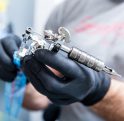Microblading, Public Health and the Law
Posted July 24, 2017 by Michael Hokanson
Microblading is a trend that is increasing in popularity with people looking to modify their appearance. The process, also known as eyebrow embroidery, is a form of semi-permanent tattooing, using ink to alter the appearance of the eyebrows. A small, hand-held blade made up of multiple needles is used to create small, shallow tattoos that resemble the natural hair of a person’s eyebrow.
It is important to know who can and who cannot legally offer microblading before having the procedure done.
Per the Official Code of Georgia, Section 31-40-1, microblading falls into the legal definition of tattooing. Since pigments are implanted under the skin during the process, only a tattoo studio permitted by a county health department can offer the service legally. Anyone offering tattooing outside of a licensed tattoo studio is operating illegally.
The unique nature of microblading leads to additional rules covering the procedure. Section 16-12-5 of the Code of Georgia further restricts tattooing when the procedure is done within one inch of the nearest part of the eye. Only a licensed physician can legally tattoo within this area; anyone else who tattoos within the area is guilty of a misdemeanor.
Put simply, microblading is tattooing and microblading can only be performed by a physician in a tattoo studio or in the physician’s office, or supervised by a physician onsite in a tattoo studio or in the physician’s office.
Why all the regulation for such small tattoos? Like all tattooing, microblading has a variety of health risks involved. Breaking the skin with unsterile equipment carries the risk of infections and transmission of diseases like staph, hepatitis, HIV and other bacteria. Poor tattooing can also lead to unsightly and hard to remove scar tissue. The type of ink used for the tattoo may even cause problems, leading to allergic reactions in some people.
“We want people to know what they’re getting into if they decide to undergo microblading,” said North Central Health District Environmental Health Director Carla Coley. “And more importantly, we want people to know what to look for in licensed, legal and safe providers of microblading and other forms of tattooing. A licensed tattoo artist will follow safety precautions that someone microblading out of their home illegally may not even consider.”
If you have questions about a facility or tattoo artist offering microblading, contact your local health department’s environmental health office.
Follow us on Facebook, Twitter and Instagram to receive news, emergency messages and health information!


 Contact Us
Contact Us Locations
Locations Job Openings at North Central Health District
Job Openings at North Central Health District Internships
Internships Board of Health
Board of Health Cost and Insurance
Cost and Insurance Privacy Policy
Privacy Policy Teens & Adults
Teens & Adults For Children
For Children Other Programs
Other Programs County Environmental Health Offices
County Environmental Health Offices Chemical Hazards
Chemical Hazards Tourist Accommodations
Tourist Accommodations Food Service
Food Service Rabies Control
Rabies Control Lead Poisoning Prevention
Lead Poisoning Prevention Body Art
Body Art Land Use
Land Use Swimming Pool Program
Swimming Pool Program Water Testing for Private Wells
Water Testing for Private Wells Environmental Health Complaints
Environmental Health Complaints Georgia Food Recall Alerts
Georgia Food Recall Alerts Personal & Family Preparedness
Personal & Family Preparedness Emergency Preparedness for Functional & Access Needs
Emergency Preparedness for Functional & Access Needs Severe Weather Preparedness
Severe Weather Preparedness Emergency Preparedness Training
Emergency Preparedness Training Medical Reserve Corps
Medical Reserve Corps Regional Healthcare Coalitions
Regional Healthcare Coalitions Strategic National Stockpile/Medical Countermeasures
Strategic National Stockpile/Medical Countermeasures